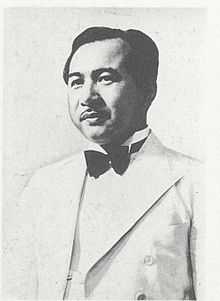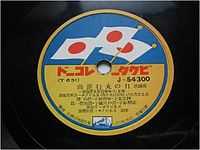Tamaki Tokuyama
| Tamaki Tokuyama | |
|---|---|
 | |
| Background information | |
| Born |
July 27, 1903 Kōza District, Kanagawa Prefecture, Japan |
| Origin | Japan |
| Died |
January 28, 1942 (aged 38) Kugenuma, Kanagawa Prefecture, Japan |
| Genres | Ryūkōka, gunka, min'yō, classical music |
| Occupation(s) | Singer, film actor |
| Years active | 1930–1942 |
| Labels | Nippon Victor Co. |
| Associated acts | Ichirō Fujiyama, Hamako Watanabe, Katsutarō Kouta, Yoshie Fujiwara, Enoken, Roppa Furukawa, Issei Mishima, Kazuhide Haida, Sōichirō Namioka, Fumiko Yotsuya |
Tamaki Tokuyama (徳山 璉 Tokuyama Tamaki, July 27, 1903 - January 28, 1942) was a classically trained baritone and a famous singer of popular music in early Shōwa era Japan.
Life and career
Tokuyama was born July 27, 1903 in a village in Kanagawa Prefecture's Kōza District, west of Yokohama. After completing high school, Tokuyama enrolled in the Tokyo School of Music (later part of the Tokyo University of the Arts). Upon completing his studies there, he become a faculty member of the Musashino Academia Musicae.
In 1930 he was signed a record contract with Nippon Victor Company where he would remain for the rest of his life. Tokuyama's song Samurai Nippon (侍ニッポン)—its lyrics based on an eponymous novel by Jiromasa Gunji that was popular at the time—became a hit in 1931, a success that was followed shortly thereafter with the comic song Runpen Bushi (ルンペン節; "runpen" is adapted from the German word for "rag" or "vagrant"). The humorous lyrics and operetta-like quality of the song earned it wide popularity and made Tokuyama one of Nippon Victor Company's biggest singing stars of the 1930s.
In 1932 he recorded a duet with Fumiko Yotsuya called Tengoku ni musubu koi (天國に結ぶ戀; trans. "A Love Bound in Heaven"), which was inspired by a notorious double suicide that had occurred in Sakatayama earlier that year.

Later Tokuyama became a noted exponent of gunka, recording very popular renditions of such songs as the Hinomaru March (日の丸行進曲) and Patriotic March (愛國行進曲). LP and CD reissues of his work in subsequent decades have tended to focus on his recordings in this genre.
Tokuyama was also a famous film actor, often appearing together with his friend, the comedian Roppa Furukawa. He also continued his career as a classical singer of opera, lieder, and chansons; making notable appearances in Japanese productions of Carmen and Hansel and Gretel, as well as singing the bass part in performances of Beethoven's Symphony No. 9. Though his career as a classical singer was an important part of Tokuyama's life, it remains mostly unknown as he cut very few classical records and none of them have ever been reissued outside of the original 78s.
In 1935 Tokuyama married and settled down in the town of Kugenume near his birthplace. He died prematurely from complications from sepsis on January 28, 1942 at the age of 38. Tokuyama is buried in the graveyard of the Jōkō-ji in Fujisawa.
Select discography
- Tattake taiko (叩け太鼓 Roar of the Drum) 1930
- Aika (哀歌 Jules Massenet's Élégie sung in Japanese, with Kunihiko Hashimoto on violin) 1931
- Samurai Nippon (侍ニッポン) 1931
- Runpen bushi (ルンペン節 Free-loader's Tune) 1931
- Tengoku ni musubu koi (天國に結ぶ戀 A Love Bound in Heaven) 1932
- Yoru no sakeba ni (夜の酒場に Night at the Bar) 1932
- Koi ni naku (戀に泣く Crying for Love) 1933
- Aikoku kōshinkyoku (愛國行進曲 Patriotic March) 1937
- Sararīman-yo (サラリーマンよ The Salaryman) 1937
- Maru-maru bushi (〇〇ぶし Round-round Tune) 1938
- Hinomaru kōshinkyoku (日の丸行進曲 Hinomaru March) 1938
- Tonarigumi (隣組 Neighborhood Association) 1940